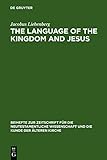The language of the kingdom and Jesus : parable, aphorism, and metaphor in the sayings material common to the synoptic tradition and the gospel of Thomas / Jacobus Liebenberg.
Material type: TextSeries: Beihefte zur Zeitschrift für die neutestamentliche Wissenschaft und die Kunde der älteren Kirche ; Beiheft 102.Publication details: Berlin ; New York : Walter de Gruyter, 2001, ©2000.Description: 1 online resource (xiv, 547 pages) : illustrationsContent type:
TextSeries: Beihefte zur Zeitschrift für die neutestamentliche Wissenschaft und die Kunde der älteren Kirche ; Beiheft 102.Publication details: Berlin ; New York : Walter de Gruyter, 2001, ©2000.Description: 1 online resource (xiv, 547 pages) : illustrationsContent type: - 9783110820799
- 311082079X
- Jesus Christ -- Parables
- Jesus Christ -- Words
- Jesus Christ -- Historicity
- Jesus Christ
- Kingdom of God -- Biblical teaching
- Metaphor
- Metaphor
- Royaume de Dieu -- Enseignement biblique
- Métaphore
- metaphor
- RELIGION -- Biblical Criticism & Interpretation -- New Testament
- Historicity of Jesus Christ
- Kingdom of God -- Biblical teaching
- Metaphor
- Words of Jesus Christ
- Parables, Biblical
- 225.6 s 226.8/06 21
- BT375.3 .L54 2001eb
- online - EBSCO
| Item type | Current library | Call number | URL | Status | Notes | Barcode | |
|---|---|---|---|---|---|---|---|
 eBook
eBook
|
Biblioteca "Angelicum" Pont. Univ. S.Tommaso d'Aquino Nuvola online | online - EBSCO (Browse shelf(Opens below)) | Online access | Not for loan (Accesso limitato) | Accesso per gli utenti autorizzati / Access for authorized users | (ebsco)560479 |
Includes bibliographical references (pages 531-547).
Preface -- 1. Eschatology, Kingdom and the Teaching of Jesus (or: Parable, Aphorism and the Historical Jesus) -- 1.0 Introduction: Setting the Scene -- 1.1 From the Life of Jesus to the Kingdom of God in the Teaching of Jesus -- 1.2 The Domination of the Parables -- 1.3 The Resumption of the Quest for the Historical Jesus -- 1.4 Redefining the Context of Jesus' Teaching: Understanding Jesus as a First-Century Jewish Peasant -- 1.5 Conclusion -- 2. Parable and Metaphor -- 2.0 Parable and Metaphor -- 2.1 From Refuting Allegory to Embracing Metaphor -- 2.2 Understanding Metaphor.
2.3 Defining Metaphor: Clarifying Terminology -- 2.4 Parable as Metaphor -- 2.5 Conclusion -- 3. The Kingdom Parables Shared by the Gospel of Matthew and the Gospel of Thomas -- 3.0 Introduction -- 3.1 Mt 13 as Context for the Parables of the Planted Weeds, Treasure, Pearl and Fishnet -- 3.2 The Contextualisation of the Matthean "Sondergut" Parables in the Gospel of Thomas -- 3.3 The Reception of the Parable of the Weeds in Mt 13:24-30 and GTh 57 -- 3.4 The Parable of the Treasure in Mt 13:44 and GTh 109 -- 3.5 The Parable of the Pearl in Mt 13:45 and GTh 76.
3.6 The Parable of the Fishnet in Mt 13:47-48 and GTh 8 -- 4. The Reception of the Parables of the Mustard Seed, Leaven, Sower and Lost Sheep in the Synoptics, Thomas and Q -- 4.1 The Parable of the Mustard Seed in the Synoptic Tradition and the Gospel of Thomas -- 4.2 The Parable of the Leaven in the Synoptic Tradition and the Gospel of Thomas -- 4.3 The Parable of the Sower in the Synoptic Tradition and the Gospel of Thomas -- 4.4 The Parable of the Lost Sheep in the Synoptic Tradition and the Gospel of Thomas.
5. Aphorism, Proverb, Kingdom and Context: the Kingdom Aphorisms Shared by the Synoptic Tradition and the Gospel of Thomas -- 5.0 Introduction -- 5.1 Proverb, Aphorism and Context -- 5.2 The Kingdom as a Possession -- 5.3 The Kingdom as a Location -- 5.4 The Arrival of the Kingdom: Q/Lk 17:21, GTh 3,GTh 51, GTh 113 -- 6. The Language of the Kingdom and Jesus -- 6.0 Introduction -- 6.1 The Kingdom Parables and Aphorisms as Polyvalent Conceptual Instruments -- 6.2 The Gospel of Thomas and the Synoptic Gospels -- 6.3 The Language of the Kingdom and the Historical Jesus -- Bibliography.
This study interprets Jesus' parables and the sayings tradition regarding the Kingdom of God from a cognitive linguistic understanding of metaphor. It also shows what contribution the theory of metaphor can make when the parables and aphorisms are studied in research on the historical Jesus. The metaphoric nature and polyvalency of the parables and aphorisms of the Jesus tradition undermine their value for research on the historical Jesus. The author doubts whether the p.


